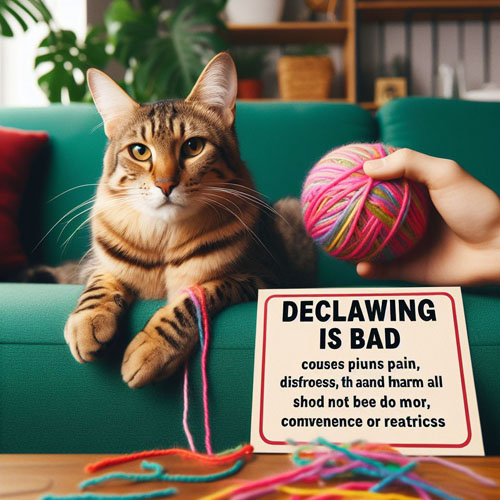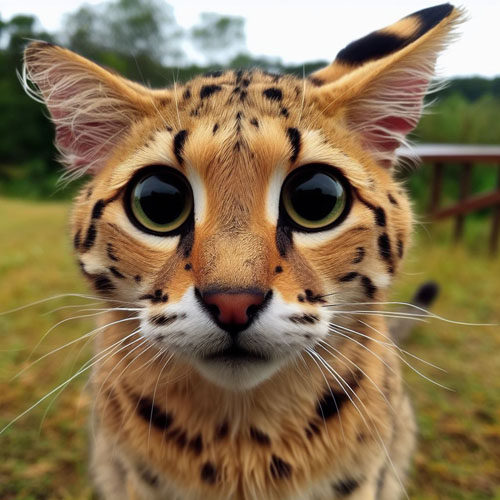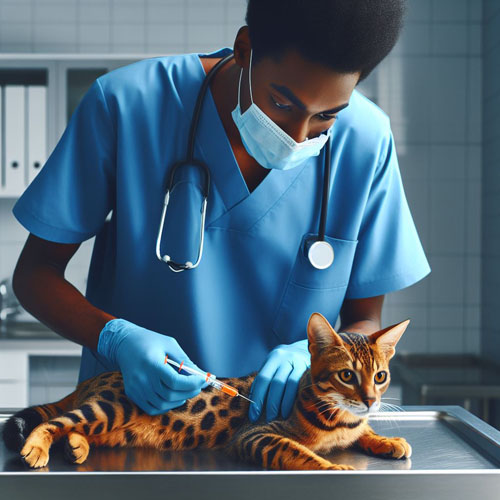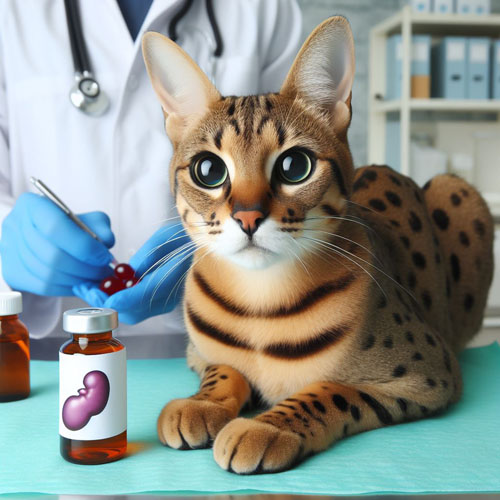Savannah Cat Health
We understand that you have a deep concern for the well-being of your Savannah cat and want to ensure that she receives the best care possible. To assist you in this endeavor, we have compiled a comprehensive list of health concerns that are commonly associated with Savannah cats. By being aware of these potential health issues, we can work together to create a personalized preventive health plan for your pet, minimizing any foreseeable risks.
It is important to note that many diseases and health conditions are hereditary and specific to certain breeds, including Savannah cats. The conditions we will discuss have been identified by feline genetic researchers and veterinary practitioners as having a higher incidence or impact on this particular breed. However, it is crucial to understand that this does not necessarily mean your cat will develop these problems, but rather that she may be more susceptible compared to other cats. Our aim is to provide you with an overview of the most common health issues observed in Savannah cats, so you can be prepared for any potential future complications. Nonetheless, if you notice any unusual signs or symptoms, please do not hesitate to consult with us.
This guide contains valuable health information that is relevant to all felines, in addition to specific genetic predispositions that are unique to Savannah cats. By familiarizing yourself with this information, you and your pet’s healthcare team can collaborate to address your cat’s individual medical needs. Towards the end of the booklet, you will also find practical tips on how to maintain your Savannah’s appearance and overall well-being at home. We hope that this information will enable you to be vigilant and proactive in monitoring your cat’s health, providing you with peace of mind knowing that you are providing the best possible care for your beloved companion.
General Health Information for your Savannah
Weight Management: Obesity is a significant issue that contributes to a markedly high number of illnesses and fatalities in cats. Although this fact is more widely recognized and comprehended today than in the past few decades, many pet owners still disregard the hazards of excess weight on their pets. Those extra pounds are one of the factors in the advancement of arthritic problems, diabetes, among other possibly life-debilitating diseases. Shedding even a few pounds can improve mobility and motivation to be active, as many people know from personal experience. The same is true for your pet. Research has proven that excess weight may lessen a pet’s life by up to two years. Overweight pets have a much higher chance of getting diabetes, an inherited disease, which may never become a problem for a cat with a healthy-weight. The more hefty a feline turns into, the more probable it is to become diabetic. Hepatic lipidosis, a fatty or greasy liver, is one more possible issue in obese pets; hepatic lipidosis can be quick to form in as little as 48 hours when an overweight pet stops eating suddenly.
So, how can we help our pets stay fit? Understanding your cat’s eating habits is a crucial factor. The typical feline likes to eat around 10-15 times each day, only a few of bites at a time. Free-feeding can works well for a lot of cats, but if a cat becomes bored, it may increase the number of trips to the food bowl. A playfully active and engaged cat will stay healthier and have some fun at the same time! Keeping your cat active will help maintain a healthy weight. Using a wand toy (a stick with a string attached), can be fun for both you and your beloved feline. se your imagination and get creative to help your cat get plenty of exercise. For really tough cases of overeating, you will have to take a firm stance and regulate your cat’s food intake.
Dental Issues: Dental illness is quite possibly of the most widely recognized ongoing issue in pets who don’t have their teeth cleaned consistently. Tragically, most felines don’t take generally excellent consideration of their own teeth, and this likely incorporates your Twist. Without additional assistance and care from you, your feline is probably going to foster possibly serious dental issues. Dental sickness begins with food buildup, which solidifies into tartar that develops on the noticeable pieces of the teeth, and in the long run prompts disease of the gums and tooth roots. Safeguarding your feline against dental infection from the outset by eliminating food buildup routinely may help forestall or postpone the requirement for cutting edge treatment of dental illness. This treatment can be unpleasant for your feline and costly for you, so preventive consideration is gainful all around. In serious instances of constant dental disease, your pet might try and lose teeth or support harm to inner organs. Furthermore, if nothing else, your feline will be a more lovely buddy not pushing everybody over with stinky feline breath! We’ll tell you the best way to keep your feline’s magnificent whites clean at home, and assist you with booking normal routine dental tests.
Vaccine-Preventable Infections: Savannahs, like all cats, can be affected by bacterial and viral infections such as panleukopenia, calicivirus, rhinotracheitis, and rabies. These infections can be prevented through vaccination, and the vaccines recommended for all cats are known as “core” vaccines. It is important to note that the risk of your cat contracting these diseases is high. Additionally, there are vaccines available to protect against other dangerous diseases like feline leukemia virus (FeLV). When determining the vaccination recommendations for your cat, we take into account the prevalence of these diseases in our area, your cat’s age, and any other lifestyle-related risk factors.
Parasites: Various types of worms and insects have the ability to invade your Savannah cat’s body, both internally and externally. This includes fleas, ticks, and ear mites that can infest her skin and ears. Additionally, hookworms, roundworms, heart-worms, and whip-worms can enter her system through different means such as drinking contaminated water, walking on infected soil, or being bitten by a mosquito carrying the infection. It is important to note that some of these parasites can also be transmitted to you or your family members, posing a serious concern for everyone’s health. For the well-being of your feline companion, it is crucial to regularly test for these parasites. A fecal exam can help detect many types of parasites, so it is advisable to bring a fresh stool sample (in an odor-proof container, please) during her biannual wellness check-ups. In addition, we will recommend preventive medication as necessary to ensure her continued health. It is essential to understand that there is no treatment available for heartworm infection in cats, making prevention the most effective approach in combating this potentially fatal disease.
Spay or Neuter: Having your Savannah spayed or neutered is one of the most beneficial actions you can take for their well-being. For females, this procedure involves the surgical removal of the ovaries and often the uterus, while males have their testicles surgically removed. Spaying or neutering your pet reduces the chances of certain types of cancers and eliminates the possibility of unwanted pregnancies or litters. Both genders typically become less territorial and less inclined to wander, with neutering specifically reducing the occurrence of urine spraying and marking behaviors in males. Additionally, performing this surgery allows us to address potential diseases your cat may develop while they are under anesthesia. For instance, if your pet requires hip X-rays to check for dysplasia or a comprehensive dental examination to detect stomatitis, these procedures can be conveniently conducted alongside the spay or neuter surgery to minimize stress for your cat. Prior to the surgery, routine blood testing helps us identify and take precautions against common issues that may increase the risks associated with anesthesia or surgery. Although it may seem like a lot to consider, rest assured that we will thoroughly discuss all the specific problems we will be monitoring with you when the time comes.
Genetic Predispositions for Savannahs
Heart Disease: Cardiomyopathy, whether inherited or caused by other diseases, refers to heart muscle disease. The most common type, known as hypertrophic cardiomyopathy (HCM), is characterized by the thickening of the heart muscle, often due to an overactive thyroid gland. Another example is dilated cardiomyopathy (DCM), which can be caused by a deficiency of the amino acid taurine in the diet. However, with the addition of taurine to cat food by major producers, DCM is now rarely observed in cats with high-quality diets.
Detecting signs of cardiomyopathy early is crucial, but cats’ tendency to conceal illness can make symptoms challenging to identify. Typically, pet owners first notice rapid breathing, lethargy, and a decreased appetite. Although these symptoms may seem sudden, they often indicate that the cat has been silently suffering for weeks or even months and is now in a critical condition.
Genetic testing is available for certain breeds of cats to identify a specific gene abnormality that causes HCM. While most cats with cardiomyopathy have a detectable heart murmur during a routine physical examination, a definitive diagnosis requires more advanced medical imaging. Regularly evaluating your pet twice, a year throughout its life is essential to identify this problem early, as it allows for the most effective treatment.
Arterial Thromboembolism: Cats suffering from heart disease may experience the formation of blood clots in their arteries, which are referred to as FATE (feline aortic thromboembolisms). These blood clots typically obstruct the blood flow just beyond the aorta, the major blood vessel responsible for supplying blood from the heart to the body. Consequently, the hind legs may be affected, leading to paralysis, coldness, or pain. FATE is an extremely serious condition that necessitates prompt action and prolonged medical attention. Fortunately, cats who survive thromboembolisms often regain full functionality of their limbs. In the event that your cat is diagnosed with heart disease, our veterinarians may prescribe medications to mitigate the risk of blood clot formation. If your cat suddenly exhibits an inability to walk or is dragging one or both hind legs while expressing distress, it is crucial not to delay seeking immediate emergency care for your beloved pet.
FLUTD: It can be frustrating and infuriating when your cat urinates outside of the litter box, especially if it happens on your favorite pair of shoes. However, it’s important not to get angry too quickly because in most cases, cats urinate around the house as a way of signaling for help. While true urinary incontinence is rare in cats and usually caused by nerve function issues, a cat urinating in inappropriate places is likely experiencing a problem and trying to get your attention. Over the years, research has revealed that what was once considered one urinary syndrome is actually several different diseases, all grouped under the term Feline Lower Urinary Tract Diseases (FLUTD). These diseases share similar symptoms, such as urinating on cool surfaces, blood in the urine, straining to urinate, or crying in the litterbox. It’s crucial to watch for these signs as they may indicate the early stages of FLUTD. If your cat displays any of these symptoms, it’s important to contact us immediately for an urgent appointment. Male cats, in particular, are at risk of blockages in the urethra caused by stones or crystals, which can quickly become a life-threatening emergency. The inability to urinate is painful and can be fatal within a few hours, so if you suspect your cat may be blocked, seek emergency care right away. Cats are skilled at hiding their illnesses, so regular urinalysis testing is essential for detecting early signs of FLUTD. This allows us to check for infections, kidney disease, urinary crystals, and even diabetes. X-rays and ultrasounds can also help identify the presence of stones in the bladder or kidneys.
Renal Failure: The term renal failure pertains to the kidneys’ incapacity to effectively carry out their tasks of eliminating waste from the bloodstream and maintaining proper hydration levels. Among older cats, kidney disease is highly prevalent, often resulting from exposure to toxins or genetic factors in younger felines. Even kittens at a very young age can experience renal failure if they have inherited kidney abnormalities. Therefore, it is advisable to conduct kidney screenings early on, prior to any surgical procedures or anesthesia, and continue monitoring throughout their lifespan. Although severe renal failure is a progressive and ultimately fatal condition, specialized diets and medications can extend the lives of cats with kidney disease, enabling them to enjoy a higher quality of life.
Hyperthyroidism: The thyroid gland, situated in the front of the throat, plays a crucial role in the body. It produces thyroxine, also known as T4, which regulates the speed of metabolic processes throughout the entire body. When the levels of T4 in the blood increase, cells in all parts of the body start functioning at a faster pace. Conversely, when T4 levels decrease, the thyroid gland produces more T4 to maintain a balanced level in the body. However, many middle-aged cats develop a non-cancerous tumor in the thyroid gland, which disrupts the control mechanism. These tumor cells continue to produce T4 despite signals to stop, causing a condition called hyperthyroidism. Hyperthyroidism typically affects cats between the ages of ten and twelve, and the symptoms may include increased activity, weight loss, vomiting, and increased thirst. In advanced cases, it can lead to heart failure, kidney failure, and fatal blood clots. Fortunately, hyperthyroidism can be easily detected through a standard blood test, and there are effective treatment options available that can cure the disease while preserving the normal thyroid cells, allowing affected cats to live a normal lifespan.
Diabetes Mellitus: Diabetes mellitus is a condition that can affect any cat breed and can be caused by genetic factors or lifestyle choices. While some cats may develop diabetes regardless of their health status, others may only become diabetic if they become overweight or consume a poor diet. By managing your cat’s weight and diet, you can significantly reduce the risk of diabetes in your pet. However, the sedentary lifestyles of indoor cats have led to a rise in the number of diabetic cats. Therefore, it is crucial to keep your indoor cat active with daily exercise to prevent weight gain and related illnesses.
Diabetes can also be linked to pancreatitis, a painful condition that can damage the cells in the pancreas responsible for producing insulin. Chronic pancreatitis, which is believed to be inherited, can lead to diabetes in cats. Symptoms of diabetes include weight loss despite a good appetite, excessive thirst, and increased urination. Regular testing for the disease is recommended, especially as your cat ages. In many cases, diabetic cats can avoid insulin injections by losing weight and switching to a high-protein, low-carbohydrate prescription diet. For Savannah cats, in particular, managing their food intake and incorporating exercise into their daily routine is crucial due to their genetic predisposition to diabetes.
Allergies/Atopy: Sneezing and itchy eyes are common symptoms of allergies to pollen, mold, or dust in humans, whereas cats with allergies experience itchy skin. This type of allergy is referred to as “atopy” and is often found on the legs, belly, face, and ears of cats. Typically, symptoms begin to appear between the ages of one and three and may worsen over time. The most common signs include excessive licking of affected areas, face rubbing, and frequent ear infections. Additionally, you may observe thinning or shortened hair in these areas, as well as red and sore skin lesions. To determine the cause of the issue, further investigation is necessary as food allergies and mites can produce similar symptoms. Fortunately, there are numerous treatment options available for this condition.
Taking Care of Your Savannah at Home: Taking care of your cat’s health and happiness at home is similar to taking care of your own. It’s important to monitor their diet, ensure they get enough exercise, and maintain their dental and coat hygiene. If you notice anything unusual, don’t hesitate to contact your veterinarian or a pet emergency hospital. Additionally, it’s crucial to follow the recommended schedule for examinations and vaccinations. During these check-ups, your cat will be tested for common diseases and conditions. Lastly, consider signing up for pet health insurance to help cover the costs of necessary medical tests and procedures throughout your cat’s life.
Routine Care, Diet, and Exercise
- To ensure a long and healthy life for your Savannah, it is crucial to incorporate a routine care schedule into your daily routine. This includes providing a proper diet and exercise routine, as well as supervising your pet like you would a young child. By keeping doors closed, picking up after yourself, and blocking off rooms as necessary, you can prevent your pet from getting into trouble, jumping on inappropriate surfaces, and putting objects in her mouth.
- Savannahs have short coats that require minimal maintenance. You can keep them clean by cloth or hand rubbing as needed, with the occasional bath. Additionally, it is important to brush your pet’s teeth at least twice a week to maintain good oral health.
- Checking your pet’s ears weekly for wax, debris, or signs of infection is also crucial. If necessary, clean them as instructed by your veterinarian. Daily play sessions that stimulate your pet’s natural desire to hunt and explore are also necessary to keep her mind and body active and prevent behavior issues.
- As cats are meticulous about cleanliness, it is important to provide a clean litter box and scoop waste daily. Ensure that your pet drinks adequate amounts of water by adding ice cubes or a flowing fountain if necessary. Finally, feed your pet a high-quality feline diet appropriate for her age and exercise her regularly with high-activity toys.
What to Watch For: An abnormal symptom in your pet could be just a minor or temporary issue, but it could also be the sign of serious illness or disease. Knowing when to seek veterinary help, and how urgently, is essential to taking care of your cat. Many diseases can cause cats to have a characteristic combination of symptoms, which together can be a clear signal that your Savannah needs help.
If you happen to notice any of the following symptoms, please do not hesitate to take your savannah to the vet.
- alterations in appetite or water consumption
- the presence of tartar build-up
- bad breath
- red gums, or broken teeth
- itchy skin accompanied by scratching, chewing, or licking
- hair loss or areas of shortened fur
- feelings of lethargy
- mental dullness or excessive sleeping,
- changes in behavior such as fearfulness, aggression, or other behavioral changes
- poor appetite – weight loss
- increased thirst and urination, voracious appetite, weight loss, excessive thirst and urination
- lastly, any abnormalities in the skin or coat, as well as excessive grooming.





